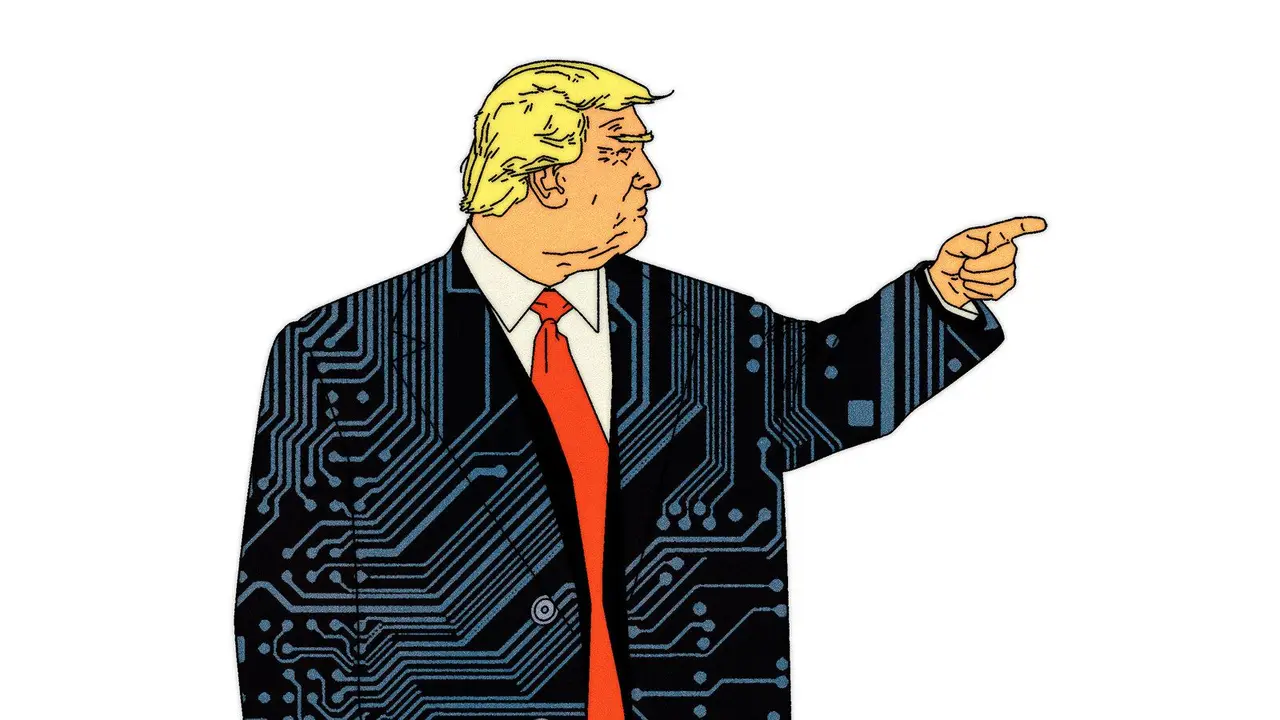Trump's FTC Chair Pick Andrew Ferguson: A Shift in Tech Regulation and AI Policy
3 Sources
3 Sources
[1]
How Trump's new FTC chair views AI, Big Tech
Dec 12 (Reuters) - Andrew Ferguson, President-elect Donald Trump's pick to chair the U.S. Federal Trade Commission, has expressed the desire to go after Big Tech companies while taking a hands-off approach to regulating artificial intelligence. Ferguson's views on social media, data privacy, AI and the need to boost American competitiveness are likely to affect the regulator's approach to companies including Meta Platforms (META.O), opens new tab, Microsoft (MSFT.O), opens new tab and Alphabet's (GOOGL.O), opens new tab Google. Here are some of the views Ferguson has expressed in statements during his term as an FTC commissioner which began in April and ends in 2030. ARTIFICIAL INTELLIGENCE The "pro-regulation side of the AI debate" is "the wrong one," Ferguson said. "A knee-jerk regulatory response will only squelch innovation, further entrench Big Tech incumbents, and ensure that AI innovators move to jurisdictions friendlier to them -- but perhaps hostile to the United States," he said in a September statement, opens new tab on the FTC's report on social media. The report called for comprehensive legislation to protect users' data and prevent AI from perpetuating discrimination. ONLINE PRIVACY Ferguson has described the vast collection, aggregation and indefinite storage of data on social media and internet users in the U.S. as an "online privacy crisis" that regulators should focus on. However, he has warned against regulating how such information is used to target advertising. "If regulators and lawmakers attempt to ban or seriously curtail targeted advertising, they will be undoing the balance of the online economy," he said. CONTENT MODERATION POLICIES Ferguson has criticized social media platforms for instituting "Orwellian policies banning nebulous categories of content like 'misinformation,' 'disinformation,' and 'hate speech.'" The FTC could take action against social media platforms if their terms of service misled users about content moderation policies. With more transparent policies, users could decide if they want to stay on the platforms, Ferguson said in December, opens new tab. "But the choice would be real only if there are suitable free-speech-respecting substitutes to the censorious platforms," Ferguson said, praising Elon Musk's "unusually firm commitment to free and open debate" after the billionaire took over social media platform X. PLATFORM COLLABORATION ON CONTENT Ferguson has expressed concern that social media platforms may have coordinated in banning Trump in 2021, taking down posts they deemed harmful during the COVID-19 pandemic, and restricting dissemination of stories about Hunter Biden's laptop computer. "If the platforms colluded amongst each other to set shared censorship policies, such an agreement would be tantamount to an agreement not to compete on contract terms or product quality," which would violate antitrust laws, Ferguson said. ADVERTISER COORDINATION Coordination between advertisers to pull money from platforms such as X over content concerns could violate antitrust laws, Ferguson said. The World Federation of Advertisers' Global Alliance for Responsible Media, which was formed to help advertisers avoid their ads being placed next to harmful content on social media, shut down after X sued, accusing it of facilitating group boycotts. Ferguson has said the FTC could investigate similar efforts. KIDS AND TEENS ONLINE Congress should pass a law that would require online service providers to give parents more control over children's online privacy, Ferguson said. "Congress should empower parents to impose whatever level of supervision and control over internet messaging they feel is right for their family and their children," he said. Reporting by Jody Godoy in New York Editing by Matthew Lewis Our Standards: The Thomson Reuters Trust Principles., opens new tab Suggested Topics:Boards, Policy & RegulationDonald TrumpRegulatory Oversight Jody Godoy Thomson Reuters Jody Godoy reports on tech policy and antitrust enforcement, including how regulators are responding to the rise of AI. Reach her at [email protected]
[2]
How Trump's new FTC chair views AI, Big Tech
(Reuters) - Andrew Ferguson, President-elect Donald Trump's pick to chair the U.S. Federal Trade Commission, has expressed the desire to go after Big Tech companies while taking a hands-off approach to regulating artificial intelligence. Ferguson's views on social media, data privacy, AI and the need to boost American competitiveness are likely to affect the regulator's approach to companies including Meta Platforms, Microsoft and Alphabet's Google. Here are some of the views Ferguson has expressed in statements during his term as an FTC commissioner which began in April and ends in 2030. ARTIFICIAL INTELLIGENCE The "pro-regulation side of the AI debate" is "the wrong one," Ferguson said. "A knee-jerk regulatory response will only squelch innovation, further entrench Big Tech incumbents, and ensure that AI innovators move to jurisdictions friendlier to them -- but perhaps hostile to the United States," he said in a September statement on the FTC's report on social media. The report called for comprehensive legislation to protect users' data and prevent AI from perpetuating discrimination. ONLINE PRIVACY Ferguson has described the vast collection, aggregation and indefinite storage of data on social media and internet users in the U.S. as an "online privacy crisis" that regulators should focus on. However, he has warned against regulating how such information is used to target advertising. "If regulators and lawmakers attempt to ban or seriously curtail targeted advertising, they will be undoing the balance of the online economy," he said. CONTENT MODERATION POLICIES Ferguson has criticized social media platforms for instituting "Orwellian policies banning nebulous categories of content like 'misinformation,' 'disinformation,' and 'hate speech.'" The FTC could take action against social media platforms if their terms of service misled users about content moderation policies. With more transparent policies, users could decide if they want to stay on the platforms, Ferguson said in December. "But the choice would be real only if there are suitable free-speech-respecting substitutes to the censorious platforms," Ferguson said, praising Elon Musk's "unusually firm commitment to free and open debate" after the billionaire took over social media platform X. PLATFORM COLLABORATION ON CONTENT Ferguson has expressed concern that social media platforms may have coordinated in banning Trump in 2021, taking down posts they deemed harmful during the COVID-19 pandemic, and restricting dissemination of stories about Hunter Biden's laptop computer. "If the platforms colluded amongst each other to set shared censorship policies, such an agreement would be tantamount to an agreement not to compete on contract terms or product quality," which would violate antitrust laws, Ferguson said. ADVERTISER COORDINATION Coordination between advertisers to pull money from platforms such as X over content concerns could violate antitrust laws, Ferguson said. The World Federation of Advertisers' Global Alliance for Responsible Media, which was formed to help advertisers avoid their ads being placed next to harmful content on social media, shut down after X sued, accusing it of facilitating group boycotts. Ferguson has said the FTC could investigate similar efforts. KIDS AND TEENS ONLINE Congress should pass a law that would require online service providers to give parents more control over children's online privacy, Ferguson said. "Congress should empower parents to impose whatever level of supervision and control over internet messaging they feel is right for their family and their children," he said. (Reporting by Jody Godoy in New York; Editing by Matthew Lewis)
[3]
Trump names Andrew Ferguson as FTC Chair. What are the Big Tech implications? By Investing.com
Investing.com -- President-elect Donald Trump has announced his intention to elevate current FTC Commissioner Andrew Ferguson to the role of Chairman, with the transition expected next month. While Ferguson has signaled support for deregulatory policies, particularly in emerging areas like AI, his vocal skepticism toward major technology companies, including Meta (NASDAQ:META), Google (NASDAQ:GOOGL), Microsoft (NASDAQ:MSFT), Amazon (NASDAQ:AMZN), and Apple (NASDAQ:AAPL), stands out. According to Ferguson, his priorities as Chair would include reversing many of the policies implemented under current FTC Chair Lina Khan. Notably, he has stated he would "Stop Lina Khan's war on mergers. Most mergers benefit Americans and promote the movement of capital that fuels innovation." On AI regulation, Ferguson has pledged to "end the FTC's attempt to become an AI regulator." However, his deregulatory stance does not extend to Big Tech. Ferguson has promised to "Focus antitrust enforcement against Big Tech monopolies, especially those companies engaged in unlawful censorship." He has also committed to pursuing both structural and behavioral remedies under antitrust laws to prevent dominant platforms from using their market position to stifle competition and innovation. Commenting on this, TD Cowen analysts suggest this could signal a continuation of significant FTC actions. For example, Ferguson is expected to maintain the agency's aggressive approach to the antitrust lawsuit against Amazon, with little likelihood of settling before the trial set for mid-2026. "And if the FTC wins, his comments suggest he would seek a breakup," analysts said. Similarly, Ferguson is likely to sustain the ongoing investigation into Microsoft, which reportedly focuses on the company's practices of potentially tying Azure revenue to Office365. Meta is also expected to remain in the FTC's crosshairs, with the agency continuing its uphill legal battle to force the divestiture of Instagram. Ferguson may also pursue Meta and Google over allegations of censorship, referencing a 2020 executive order directing the FTC to examine "unfair or deceptive acts or practices" related to speech moderation by Section 230-covered entities. "In other words, even 230-protected content might be found unlawful by the FTC," analysts noted. Another area of focus could be generative AI mergers and acquisitions (M&A). Ferguson's comments raise questions about whether the largest tech firms will face heightened scrutiny in their attempts to acquire pieces of the generative AI ecosystem. This could complicate efforts by tech giants to leverage M&A as a strategy to manage risks and maximize opportunities in the rapidly growing field.
Share
Share
Copy Link
President-elect Donald Trump's nomination of Andrew Ferguson as FTC Chair signals a potential shift in tech regulation, with a focus on Big Tech scrutiny and a hands-off approach to AI.

Trump Nominates Andrew Ferguson as FTC Chair
President-elect Donald Trump has announced his intention to elevate current Federal Trade Commission (FTC) Commissioner Andrew Ferguson to the role of Chairman
1
. This nomination signals a potential shift in the regulatory landscape for technology companies and artificial intelligence (AI) in the United States.Ferguson's Stance on AI Regulation
Ferguson has expressed a clear preference for a hands-off approach to AI regulation. He believes that the "pro-regulation side of the AI debate" is "the wrong one"
1
. Ferguson argues that knee-jerk regulatory responses could stifle innovation, entrench Big Tech incumbents, and drive AI innovators to more friendly jurisdictions2
. He has pledged to "end the FTC's attempt to become an AI regulator"3
.Approach to Big Tech and Antitrust
Despite his deregulatory stance on AI, Ferguson has expressed a desire to go after Big Tech companies. He has promised to "Focus antitrust enforcement against Big Tech monopolies, especially those companies engaged in unlawful censorship"
3
. This approach could affect companies like Meta Platforms, Microsoft, Alphabet's Google, Amazon, and Apple.Content Moderation and Free Speech
Ferguson has been critical of social media platforms' content moderation policies, describing them as "Orwellian policies banning nebulous categories of content like 'misinformation,' 'disinformation,' and 'hate speech'"
1
. He has praised Elon Musk's approach to free speech on X (formerly Twitter) and suggested that the FTC could take action against platforms if their terms of service mislead users about content moderation policies2
.Online Privacy and Advertising
While Ferguson has described the vast collection and storage of user data as an "online privacy crisis," he has warned against regulating targeted advertising. He believes that attempts to ban or curtail targeted advertising could disrupt the balance of the online economy
2
.Related Stories
Potential Impact on Ongoing Cases and Investigations
Ferguson is expected to maintain the FTC's aggressive approach in several ongoing cases and investigations:
- The antitrust lawsuit against Amazon, with a potential breakup if the FTC wins
3
. - The investigation into Microsoft's practices regarding Azure revenue and Office365
3
. - The ongoing legal battle to force Meta to divest Instagram
3
.
Implications for AI and Tech Industry
Ferguson's appointment could have significant implications for the AI and tech industry. While his hands-off approach to AI regulation might encourage innovation, his focus on Big Tech scrutiny could complicate efforts by major tech firms to acquire or develop AI technologies. This tension between deregulation and antitrust enforcement may shape the competitive landscape in the rapidly evolving field of generative AI and other emerging technologies.
References
Summarized by
Navi
[1]
[2]
Related Stories
Biden Administration's Final Push on Tech Regulation: AI and Antitrust in Focus
11 Dec 2024•Policy and Regulation

FTC Advances Broad Antitrust Probe into Microsoft's AI and Cloud Operations
13 Mar 2025•Policy and Regulation

Big Tech's Overtures to Trump: Seeking Favorable AI Policies and Regulatory Relief
18 Dec 2024•Business and Economy

Recent Highlights
1
ByteDance Faces Hollywood Backlash After Seedance 2.0 Creates Unauthorized Celebrity Deepfakes
Technology

2
Microsoft AI chief predicts artificial intelligence will automate most white-collar jobs in 18 months
Business and Economy

3
Google reports state-sponsored hackers exploit Gemini AI across all stages of cyberattacks
Technology





